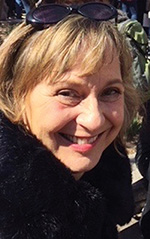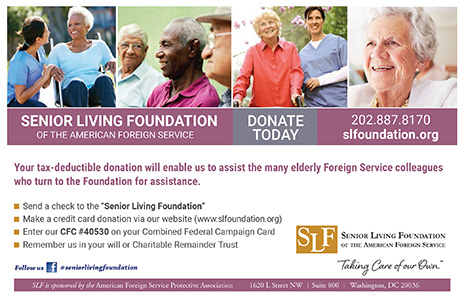10 Things I Wish I Had Known: Confessions of a Recent Retiree
BY DOLORES BROWN
Retirement sneaks up on you— and it doesn’t. I prepped for it over many years, methodically putting money away, deciding on my retirement destination of choice (I’m remaining in the D.C. area) and, most recently, scouting out couch-surfing opportunities with my stillemployed Foreign Service friends. But when the final days of my career were upon me, I remembered like yesterday lamenting with my A-100 classmates that in most career spans we could only serve in about eight overseas posts.
I knew I wanted to do more, but I wasn’t sure what. I also thought I knew what I needed to know. I was wrong. Here are 10 things I wish I had known as the big day closed in:
1. It can be really energizing to shake your life up. The first rule of thumb for me was to stop focusing on the end of life as I knew it, and to start looking forward. The Foreign Service Institute’s Job Search Program supports the transition from old habits of mind to new, which was very helpful (see #10 for more). For those who aren’t able to take the course, you will chart your own evolution; but believe me, it’s a liberating process. And we Foreign Service members tend to have the renewal gene—if nothing else, we are adaptable.
2. Don’t pay attention to newspaper headlines trumpeting that you need $1 million to retire. Those newspapers and magazines are not factoring into their $1 million equation a reliable lifetime annuity. Figure out how much your annuity is worth over the span of time you’re likely to receive it, and you’ll see that your retirement nest egg is considerably larger than you think. In addition, although I underscore I am no financial adviser, given that we receive a stable and reliable income through our annuity, we can choose to be more aggressive in our investment strategy with other funds we have at our disposal. This strategy can provide a hedge against inflation and unforeseen events.
To learn more, take advantage of FSI’s battery of retirement courses starting in mid-career and tune into AFSA webinars on retirement subjects as early as possible.
3. It’s a new world out there in terms of job-hunting. I think we all realize that applying for jobs now happens online. But do you know how to get your resumé noticed? The answer is keywords. After all, a computer is doing the initial culling and will only spit out resumés and letters that include the words for which it’s looking. So don’t use your own vernacular; instead, use phrasing that is included in the job advertisement to better your chances to scale this hurdle. In addition, be aware of pitfalls when using technology. One speaker at the JSP told an entertaining but apocryphal tale about a woman who conducted her Skype job interview in her daughter’s room, where the family’s laptop resides. The problem was that behind this professional-looking applicant hung a Technicolor poster of ponies, not exactly the image one wants to project. Oh, and don’t forget to wear your pants or skirt—you never know if you may have to get up.
4. There is a wide variety of appealing full- and part-time work out there. And, I’d venture to say, something for everyone who wants it. Again, I had the benefit of the JSP and its excellent line-up of speakers, which introduced participants to an appealing smorgasbord of possibilities. We were introduced to options ranging from professional mediator, to highly skilled Peace Corps Volunteer for short stints, to English as a Second Language teacher, to consultant, to writer, etc. There is a whole universe out there beyond the WAE/RAE route, if you’re looking for something different or moving outside the D.C. area.
5. It’s harder than you think to put together a great resumé. Resumés now generally include a concise upfront statement about who you are, what you want to do and what you have to offer—a thought-provoking exercise in itself. One trend that was difficult for my colleagues in our JSP resumé working group was the notion that we needed to throw in adjectives to describe our stellar qualities in this statement, something that is difficult for anyone who is uncomfortable with braggadocio. In addition, you really need honest and careful people to critique your resumé, which takes time. Six of us went over each other’s draft resumes with fine-toothed combs not once, but twice. This was an exhaustive process, something that I don’t recommend you ask your best friend(s) to do. Or, if you do, take them out for a big dinner at the end of it all.
6. Consider taking out long-term care insurance earlier rather than later. No one likes to think about this when they’re young, but anyone who has navigated a loved one through the health care system when long-term assistance is needed will recognize the wisdom of considering this insurance. In addition, the decision you make on this subject could have a huge impact on whether your estate remains fully intact for your heirs. Experts will tell you to read the fine print so that you know precisely what is covered and what isn’t—it isn’t a step to take lightly. There are alternatives in the form of buying into senior communities in which you can be assisted part- or full-time as you age, but that can be a costly proposition. The point is that if you know you wish to opt for long-term care insurance, it is much less expensive the earlier you sign up.
You’ll find a recent video on the topic of long-term care insurance at afsa.org/video.
7. Personal cards are not 19th-century relics. Remember those sprawling Victorian novels in which characters would leave their calling cards on the fireplace mantle? That’s what I thought of when the JSP introduced the idea of personal cards. But I buckled, got them, and have used them often as I’m navigating in new environments and making new connections.
8. Get sound, individualized professional financial advice and focus on tax implications early. Okay, I admit I didn’t do this; but you should. The decisions you make even 15 years before you retire can reverberate for good or ill when you are nearing retirement. Focus particularly on the tax and estate planning implications of each available option.
9. Don’t worry if it takes time to absorb all of the information on finances, Medicare and other health care options, elder care, etc. I had to hear about the difference between a guaranteed annuity from TSP and other alternatives for withdrawing funds many times before the information stuck. I find many topics are like that. Start earlier than you think and revisit every few years as your circumstances and the general investment landscape may change. And visit AFSA’s website (afsa.org/afsa-video) as often as you like to view videos on a variety of retirement topics.
10. Sign up for the JSP. If you’ve read this far, you know I’m a fan of the Foreign Service Institute’s Job Search Program, which helped me on both a practical and psychological level as I faced retirement. The line-up of speakers includes foreign affairs agency retirees, professional recruiters and experts in relevant professional areas, covering the bases from health insurance to annuities, from tax implications of Roth IRAs to tax-favorable states.
Participants also break up into small groups to discuss their ideas about the future—not just about work, but holistically—and test those ideas in a supportive atmosphere. This exercise both sharpened my thinking and opened me up to possibilities I hadn’t previously considered.
Most importantly, the JSP helped me to realize that retirement is simply part of a continuum in one’s life, not a euphemism for an ending. It’s a label for what may come after full-time work, and doesn’t necessarily mean a golf cart on a golf course. My colleagues and I all came up with unique plans for the next few years thanks to our JSP experience, but all of our plans had one thing in common: they drew on our experience and what was closest to our hearts. And that good old Foreign Service adaptability doesn’t hurt, either.





